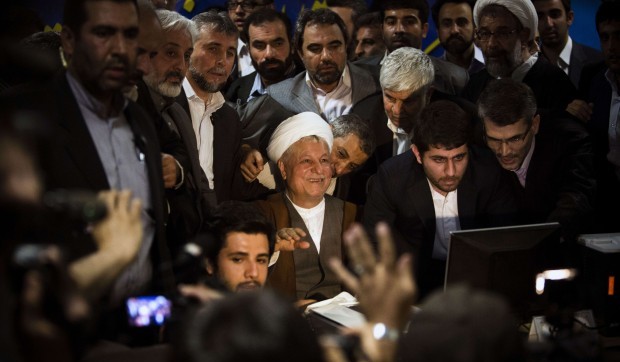
Former Iranian president Akbar Hashemi Rafsanjani (C) registers his candidacy for the upcoming presidential election at the Interior Ministry in Tehran on May 11, 2013. (AFP PHOTO/BEHROUZ MEHRI)
London, Asharq Al-Awsat—The list of presidential hopefuls was completed by 6 pm in Tehran. After months of speculation about which heavyweight candidates would be competing in the elections, Hashemi Rafsanjani and Esfandiar Rahim Mashaei officially submitted their candidacies on Saturday.
Speculations grew rife as the registration deadline approached and no news emerged about Rafsanjani and Mashaei’s nomination. Had they not decided to run, the election would have been a one-horse race for a favored conservative candidate, most likely from the 1+2 coalition made up of Ali Akbar Velayati, Gholam Ali Haddad Adel and Tehran mayor Mohamamd Baqer Qalibaf. The coalition is said to be very close to Ayatollah Khamenei.
Former presidents Hashemi Rafsanjani and Seyed Mohamamd Khatami—both supported by the technocrats and moderate reformists—had closely assessed the situation to see who would have the better chance of defeating the hardline conservative faction supported by Ayatollah Khamenei. Both Rafsanjani and Khatami have been outspoken over the past several months, heating up the political debate surrounding the election and encouraging each other to stand for the presidency.
Ultimately, Khatami’s decision not to enter the election race is due to his support for Mir Hossein Mousavi and Mehdi Karroubi during the last elections in 2009. Khatami had predicted that his chances of being accepted by the Guardian Council would be very limited and he did not want to face disqualification at this time, perhaps with an eye on a possible 2018 presidential run.
In response to calls to nominate himself, Khatami issued a statement on his website, saying, “Even if we get a chance to run in the election, we won’t have the right to receive more than a certain number of votes,” bitterly citing the “engineering of elections” that has taken place since 2005.
As for Hashemi Rafsanjani, he has been closely and carefully assessing the possibility of running for office once more. Prior to this, Rafsanjani had emphasized on more than one occasion that he would only submit his candidacy after receiving the green light from Ayatollah Khamenei.
Rafsanjani’s late entry into the election race either means that Khamenei finally approved his nomination, or more likely, that the former president reached the limit of his patience and decided to stand anyway. His decision to run may determine the fate of the Islamic Republic, particularly as he was strongly involved in Iranian revolutionary politics even before the 1979 revolution.
Mashaei’s nomination has also been the subject of intense speculation, particularly as he is Ahmadinejad’s chosen successor. His absence would have been viewed as the end of the Ahmadinejad phenomenon in Iranian politics. Over the past eight years, Mashaei has been specifically groomed by Ahmadinejad as his successor, and he is the departing president’s closest confidant and ally.
Ahmadinejad invited Mashaei to accompany him on his latest tour of the country, showcasing him to the people. If Mashaei had not nominated himself, it would have meant an easy ride for Ayatollah Khamenei’s prospective candidate, and he could have ensured his absolute power by purging both moderate reformists and Ahmadinejad’s chosen successor.
Just minutes before the end of the registration deadline, President Ahmadinejad unexpectedly accompanied Mashaei to the Interior Ministry. Ahmadinejad was circled by journalists who questioned him, asking if the sitting president accompanying a nominee in this manner was illegal.
“I have taken a leave from my duties today, so [my presence and support for Mashaei] is legal,” Ahmadinejad told reporters.
With the registration of Hashemi Rafsanjani and Mashaei, the electoral map is shaping up between three main camps, although this is conditional on the Guardian Council’s approval of Mashaei’s eligibility.
The first camp is made up of reformist and moderates backing Rafsanjani.
Second, there is the emerging Bahariyon (Spring) camp. The name is derivedfrom their chief slogan, Zendeh bad bahar (Long live the Spring). They are supporting Esfandiar Rahim Mashaei, and are a combination of urban youth fascinated by Mashaei’s liberal policies on culture and society and poor rural voters dependent on government handouts.
Third, the “principlist” camp loyal to Ayatollah Khamenei, which includes core conservatives and hardliners, will support a range of candidates.
Analyzing this situation, it is clear that supporters of Ayatollah Khamenei are fragmented and their potential votes are spread across too many candidates. They must unite behind a single candidate in order to be able to adequately compete with either Rafsanjani or Mashaei.
Both Rafsanjani and Mashaei can benefit from their promises of changing the status quo that has resulted in the worst economic and political crisis for Iranians in modern history.
Whoever emerges as the conservatives’ candidate will be seen as the heir of the current state of affair,s and most probably will find themselves in a disadvantageous position compared to Hashemi Rafsanjani and Mashaei in a free and fair election.
Final figures show that the total of registered candidates stood at 686; 37 of whom could be categorized as well-known politicians. 656 men and 30 women registered as presidential candidates. The registration files will be handed over to the Guardian Council tomorrow morning, which will select eligible candidate over the next five days. On May 16, the list of eligible candidates will be announced, and there will be a five -ay deadline for appeals ending May 21. From May 23, all candidates approved by the Guardian Council will be able to officially start their election campaign.
